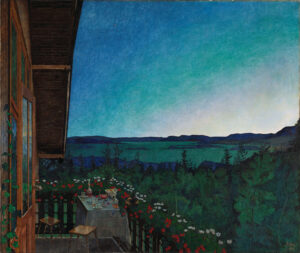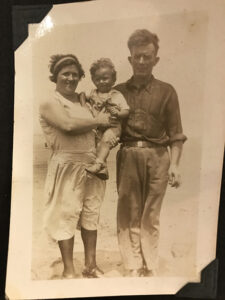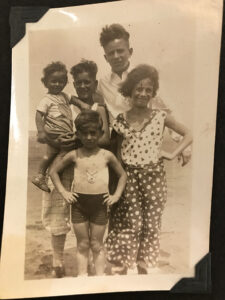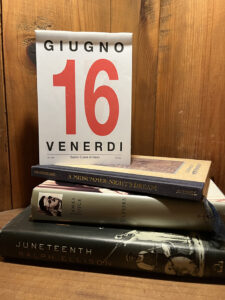June 21 this year brings the June Solstice: Midsummer in the Northern Hemisphere, Midwinter in the Southern. As precision goes, the solstice moment this time around, more or less (for there are variations east and west within time zones), is 10:57 AM here in US Eastern Daylight Time. That is the moment when the sun’s rays strike the Tropic of Cancer, 23.5° north of the Equator. It is our longest day in the Northern Hemisphere. And for a lovely explanation of why (by way of a fresh lemon representing Earth), I invite you to watch a short video by one of the people on this planet that I really admire: Lia Leendertz, author of The Almanac, which you might think of as a Book of Days with a British focus, explains the celestial mechanics while offering some thoughts on Midsummer in a charming video she released just yesterday.
This 23.5° tilt of the Earth brings us our seasons, and today, we reach the extreme that brings the most sunlight to the Northern Hemisphere. It is the start of summer by the almanac, but our ancestors saw this as the height of summer, hence its older monicker: Midsummer. And just as the Midwinter solstice in December is soon followed by Christmas Eve and Christmas Day, so too is the Midsummer solstice soon followed by St. John’s Eve and St. John’s Day. St. John’s Eve will come on Friday, the evening of the 23rd, and St. John’s Day on the 24th. This St. John is John the Baptist: the cousin of Jesus, he who was sent to prepare his way. All those feast days of saints that we celebrate throughout the year… like when we eat zeppole on St. Joseph’s Day, or minne de virgine on St. Agatha’s Day, or soda bread on St. Patrick’s Day: all these feasts commemorate the day each of these people left this earthly life. There are only three birthdays the Church celebrates each year: Jesus, Mary, and John the Baptist. It’s the two cousins that are the more fascinating here, because the Church placed their birthdates at the solstices. No one knows for sure when they were actually born, but they are placed in this particular order in the round of the year for metaphoric reasons: St. John is born at the brightest time of the year, the time of our longest days. But what happens immediately after the Midsummer solstice? Sunlight begins to decrease a little bit each day. It is the Constant Rearrange: no day exactly like the one that came before or the one that follows. John himself tells us something to the effect of, “I must decrease so he may increase.” John prepares the way for Jesus, the Light of the World. And Jesus is born then, at the opposite pole of the year, the time of our darkest days, our longest nights, just as sunlight is again increasing.
That is one version, anyway. It is the old old story and a fascinating one: the story of our planet and its place in the universe and it is our story, too, no matter which players you place in the roles. The planet continues its journey around the sun at its 23.5° tilt and with it comes summer and fall and winter and spring and therein, in this simplicity, lies the mystery. The mystery of our unfolding days and the spiraling circular nature of our existence.
*
SPEND MIDSUMMER WITH US
Join me on Friday, June 23, in the afternoon hours before St. John’s Eve begins, for the Real Mail Fridays Midsummer Social on Zoom. This online social runs from 2 to 5 Eastern, and you may come and go as you please for time to get things done (letter writing or otherwise) in the company of friends from around the globe. We will feature music by Felix Mendelssohn and readings from Shakespeare’s A Midsummer Night’s Dream, mixed in with some other music fitting for the height of summer, and once an hour we’ll take a little break for some casual banter. We welcome you to join us from wherever you are by clicking here. Real Mail Fridays is always a very heartwarming time and this week it’s a midsummery time, too.
Saturday evening, St. John’s Night, Seth & I are thinking about going to the Midsummer Fest––the Juhannusjuhla––outdoors at Finnish-American Village, weather permitting. There’ll be a traditional midsummer bonfire! Entry is $5. Finnish American Village is at 1800 South Drive here in Lake Worth, Florida. The festivities begin at 6 PM, but if we go, we’ll be going later, as I am teaching a workshop that day at the Jaffe Center for Book Arts called Book Arts 101: Midsummer Night’s Dream and then we’ll be having a traditional Swedish Midsommar feast, of the carry-out sort, from our friends at Johan’s Jöe in West Palm Beach. They are accepting Midsommar catering orders through Thursday. Everything at Johan’s is always delicious! Here’s a link to order your own Midsommar feast from Johan’s. Highly recommended!
Also online, I invite you to watch the episode of Stay Awake Bedtime Stories that I recorded last year for Midsummer: It’s my own retelling of A Midsummer Night’s Dream, an adaptation of the 1899 story version by Edith Nesbit. It’s a fun time. And in the video, I’m wearing an awesome floral crown that Seth made for me. Click here to watch.
MIDSUMMER SALE
At our online catalog, use discount code BLOSSOM to take $10 off your order of $85 or more, plus get free domestic shipping. Good on everything in the shop! Click here to shop! Happy Midsummer to you all. Glad Midsommar. Hyvää Juhannusta.
Image: “Summer Night (Sommernatt)” by Harald Sohlberg. Oil on canvas, 1899. National Museum of Art, Architecture and Design. [Public domain] via Wikimedia Commons.



